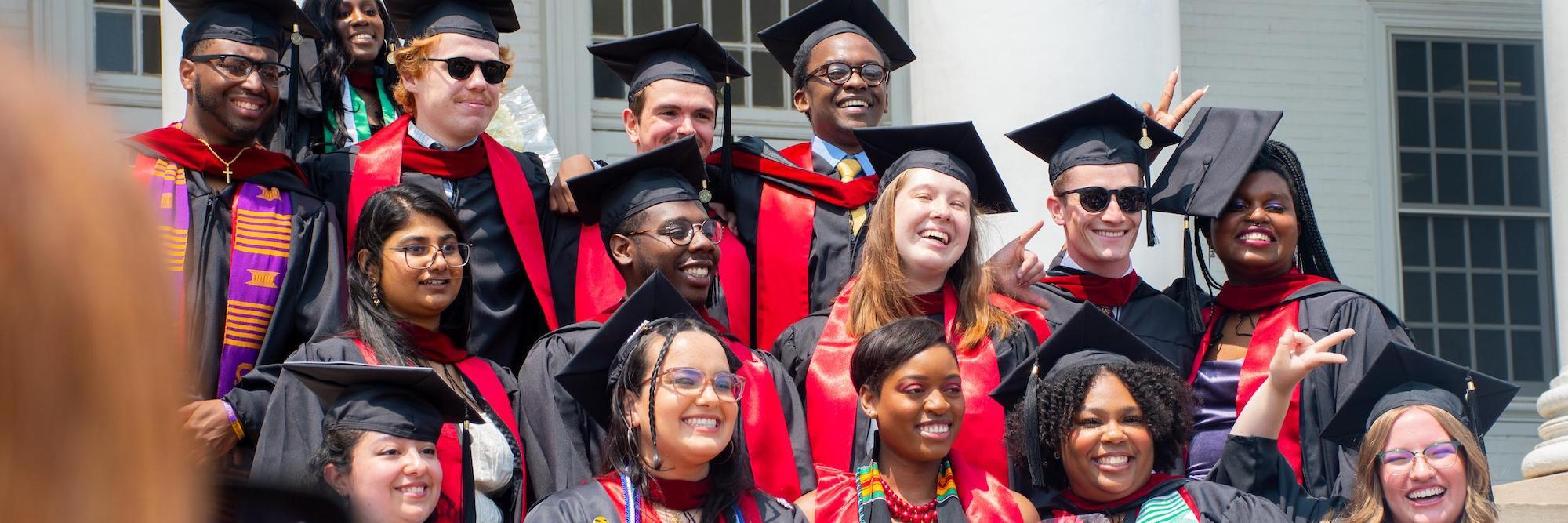Master's Degree
If you're a recent graduate looking to tell powerful stories, a professional journalist ready to up your game or a pro in an unrelated field pondering a career change, then this is the program for you.
The Philip Merrill College of Journalism offers three master’s degree programs and a highly flexible curriculum — whether you’re interested in:
- Local news
- Investigations
- Data and AI
- Public affairs and politics
- Sports
- Broadcast
- Digital design, graphics and web development
- Audience engagement and social media
- Documentary and video production
- Business and money
- Podcasting
- Photojournalism
Explore our programs below.
Master of Journalism (M.J.): Professional Track
The Master of Journalism degree is a non-thesis program that requires a minimum of 30 credits. This program is intended for students, whether experienced or not, who want to work as professional journalists after graduation. M.J. students’ degree program culminates in a review of their journalism portfolio by a panel of faculty and professionals. Students can personalize their course of study to match their career ambitions. In their last semester, M.J. students enroll in a six-credit capstone course in one of the Capital News Service (CNS) bureaus on campus, in Annapolis or Washington, D.C.
Students may choose to specialize in Multiplatform Journalism or Broadcast Journalism. Students who choose Multiplatform Journalism may further specialize by completing a suggested sequence of courses.
Multiplatform
Summer | 1 credit
Basics of Writing and Editing (JOUR502) 1 credit
- This course is delivered online over three weeks
- Students with significant journalism experience may test out of this course
Fall | 12 credits
Public Affairs Reporting (JOUR620) 3 credits
Data Journalism (JOUR772) 3 credits
Journalism Elective 3 credits
- Options include but are not restricted to:
- Interactive Design and Development (JOUR 652)
- Social Media Content Creation, Audience Engagement and Analytics (JOUR657)
- Photojournalism (JOUR 670)
- News Videography (JOUR 603)
Journalism Law and Ethics (JOUR702) 3 credits
Spring | 9 credits
Intermediate Reporting 3 credits
- Options include but are not restricted to:
- Urban Affairs Reporting (JOUR627)
- Advanced Audio and Podcast Reporting (JOUR664)
- Advanced Public Affairs Reporting: Investigative Journalism (JOUR 635)
Journalism Elective 3 credits
- Options include but are not restricted to:
- Understanding Audiences and Analytics (JOUR475)
- Sports Writing and Reporting (JOUR682)
- Audio and Podcasting Reporting (JOUR 634)
Visual Journalism Elective 3 credits
- Options include but are not restricted to:
- Photojournalism (JOUR 670)
- News Videography (JOUR 603)
- Interactive Design and Development (JOUR652)
- Designing Stories with Motion Graphics (JOUR 637)
Fall | 9 credits
Capstone 6 credits
- Capital News Service (4 days/week)
- Advanced Capital News Service Bureau (JOUR625) Annapolis
- Advanced Capital News Service Bureau (JOUR625) Washington
- Advanced Online News Bureau (JOUR655) Data/Design
- Advanced Online News Bureau (JOUR655) Audience/Social
Critical thinking 3 credits
- Options include but are not restricted to:
- Theories of Journalism and Public Communication (JOUR 601)
- History of Investigative Journalism (JOUR 757)
- Sports, Protest and the Media (JOUR 447)
Broadcast
Summer | 1 credit
Basics of Writing and Editing (JOUR502) 1 credit
- This course is delivered online over three weeks
- Students with significant journalism experience may test out of this course
Fall | 12 credits
Journalism Law and Ethics (JOUR702) 3 credits
Public Affairs Reporting (JOUR620) 3 credits
Broadcast News Writing (JOUR660) 3 credits
News Videography (JOUR603) 3 credits
Spring | 9 credits
Television Reporting and Production (JOUR661) 3 credits
Intermediate Broadcast Elective Menu, 3 credits
- Options include but are not restricted to:
- Audio & Podcast Reporting (JOUR634)
- Broadcast News Producing (JOUR 662)
- Studio Production (JOUR636)
- Designing Stories with Motion Graphics (JOUR637)
Journalism Elective Menu, 3 credits
- Options include but are not restricted to:
- Interactive Design and Development (JOUR652)
- Data Journalism (JOUR772)
- Social Media Content Creation, Audience Engagement and Analytics (JOUR657)
- Sports Writing and Reporting (JOUR682)
- Advanced Public Affairs Reporting: Investigative Journalism (JOUR 635)
Fall | 9 credits
Capstone 6 credits
- Capital News Service
- Broadcast News Bureau (JOUR667)
Critical thinking 3 credits
- Options include, but are not restricted to:
- Theories of Journalism and Public Communication (JOUR 601)
- History of Investigative Journalism (JOUR 757)
- Sports, Protest and the Media (JOUR 447)
Students may also be invited to spend a fourth semester embedded in the college’s Howard Center for Investigative Journalism. The Howard Center semester is an additional six credits.
Total Credits: 30-37
To fulfill degree requirements, Master of Journalism students may mix and match elective courses or select from a series of courses under the headings below to complete the program deeply prepared for a specific journalism job. The course sequences described below are a guide only, and other combinations may be possible.
NOTE: Not every course is available every semester. The number of courses a student may take is limited by time and course load. Courses must be approved by the director of the master’s program.
Audience Engagement and Analytics
Journalism Elective
- Understanding Audiences and Analytics (JOUR475) 3 credits
Journalism Elective or Visual Journalism Elective
- News Coverage of Specialized Topics; Social Video Journalism (JOUR689D) 3 credits
- Social Media Content Creation, Audience Engagement and Analytics (JOUR657) 3 credits
Capstone
- Advanced Online News Bureau (JOUR655) 6 credits
Audio Storytelling
Journalism Elective
- Audio and Podcast Reporting (JOUR634) 3 credits
Intermediate Reporting
- Advanced Audio and Podcast Reporting (JOUR664) 3 credits
Broadcast
Required Courses
- Broadcast News Writing (JOUR660) 3 credits
- News Videography (JOUR603) 3 credits
- Television Reporting and Production (JOUR661) 3 credits
Elective Courses
- Intermediate Broadcast Elective Menu, 3 credits
- Journalism Elective, 3 credits
Capstone
- Broadcast News Bureau (JOUR667) 6 credits
Business and Money
Journalism Electives
- Follow the Money: Reporting on Business (JOUR471) 3 credits
- Media Entrepreneurship (JOUR455) 3 credits
- Special Topics in Journalism; Managing Nonprofit Newsrooms (JOUR458N) 3 credits
Intermediate Reporting
- Specialized Topics in News Writing and Reporting; Business and Economics (JOUR628R) 3 credits
Data and AI
Required Core Course
- Data Journalism (JOUR772) 3 credits
Journalism Elective (choose one)
- News Coverage of Specialized Topics; News Alchemy: Journalism and Artificial Intelligence (JOUR689W) 3 credits
- News Coverage of Specialized Topics; Investigative Reporting with Artificial Intelligence and Open Source Intelligence (OSINT) Data (JOUR689X) 3 credits
- Special Topics in Journalism; Machine Editors: Search Engines, Social Media, and The News (JOUR458A) 3 credits
Journalism Elective (choose one)
- Special Topics in Data Gathering and Analysis; Sports Data Analysis and Visualization (JOUR479X) 3 credits
- Specialized Topics in News Writing and Reporting; News Application Development (JOUR628O) 3 credits
- Seminar in Research Problems; Computational Text Analytics in Python (JOUR779P) 3 credits
Visual Journalism Elective (choose one)
- Interactive Design and Development (JOUR652) 3 credits
- Specialized Topics in News Writing and Reporting; Data Visualization (JOUR628T) 3 credits
Capstone (choose one or a combination, with permission)
- Advanced Online News Bureau (JOUR655) 6 credits
- Advanced Capital News Service Bureau (JOUR625) 6 credits
- Broadcast News Bureau (JOUR667) 6 credits
Data Analysis and Web Development
Required Core Course
- Data Journalism (JOUR772) 3 credits
Journalism Electives
- Interactive Design and Development (JOUR652) 3 credits
- News Applications Development (JOUR628O) 3 credits
Capstone
- Advanced Online News Bureau (JOUR655) 6 credits
Digital Design and Visualization
Required Core Course
- Data Journalism (JOUR772) 3 credits
Journalism Electives
- Interactive Design and Development (JOUR652) 3 credits
- Specialized Topics in News Writing and Reporting; Data Visualization (JOUR628T) 3 credits
- Designing Stories with Motion Graphics (JOUR637) 3 credits
Capstone
- Advanced Online News Bureau (JOUR655) 6 credits
Investigative Journalism
Journalism Elective
- News Coverage of Specialized Topics; Investigative Reporting with Artificial Intelligence and Open Source Intelligence (OSINT) Data (JOUR689X) 3 credits
Intermediate Reporting
- Advanced Public Affairs Reporting: Investigative Journalism (JOUR635) 3 credits
- Urban Affairs Reporting (JOUR627) 3 credits
- Specialized Topics in News Writing and Reporting; Enterprise Sports Reporting (JOUR628G) 3 credits
- Specialized Topics in News Writing and Reporting; Advanced Howard Center Investigations I (JOUR628C) 3 credits
- Specialized Topics in News Writing and Reporting; Advanced Howard Center Investigations II (JOUR628I) 3 credits
Critical Thinking
- History of Investigative Journalism (JOUR757) 3 credits
Photojournalism/Visual Journalism
Journalism Elective or Visual Journalism Elective
- Photojournalism (JOUR670) 3 credits
- Topics in Broadcasting and Electronic Media; Advanced Photojournalism (JOUR668N) 3 credits
- News Videography (JOUR603) 3 credits
- Topics in Broadcasting and Electronic Media; Documentary Filmmaking (JOUR668X) 3 credits
- Topics in Broadcasting and Electronic Media; Video Innovation (JOUR668K) 3 credits
- Designing Stories with Motion Graphics (JOUR637) 3 credits
Sports and Society
Journalism Elective
- Sports Reporting and Writing (JOUR682) 3 credits
Intermediate Reporting
- Specialized Topics in News Writing and Reporting (JOUR628J or JOUR628M) 3 credits
Critical Thinking
- Special Topics in Journalism; Sports, Protest, and the Media (JOUR 447) 3 credits
Master of Arts (M.A.): Research Track
The Master of Arts in Journalism is a research-oriented, thesis program of 30 credits. The program is intended for experienced journalists, academics and others who are looking for a more scholarly master’s program. Students in the M.A. program must successfully complete a thesis under the supervision of a graduate advisor. Students must complete a theory class, a methods class, and 6 credits of master’s thesis research.
Master of Professional Studies in Data Journalism (M.P.S.): From-Anywhere Degree
The Master of Professional Studies in Data Journalism degree is a nonthesis program that requires up to 36 credits. It is offered jointly by Merrill College and the UMD College of Information. Courses will be offered both online and in person, with it being possible to complete the degree from anywhere. Students can complete the degree entirely virtually, in person or via a combination of the two. This program is intended for students who want to work as data journalists in newsrooms, and for those who want to use investigative data skills to work at NGOs, nonprofits or private industry. M.P.S. students will apply what they learn in a required six-credit capstone course either through Merrill College or the INFO College.
Master's Program Mission
Our master’s education concentrates on professional development, providing postgraduate education to those seeking to enter the field and intensive professional training for mid-career journalists with a particular focus on investigative, sports, security and computational journalism.
For More Information

Alexander Pyles


